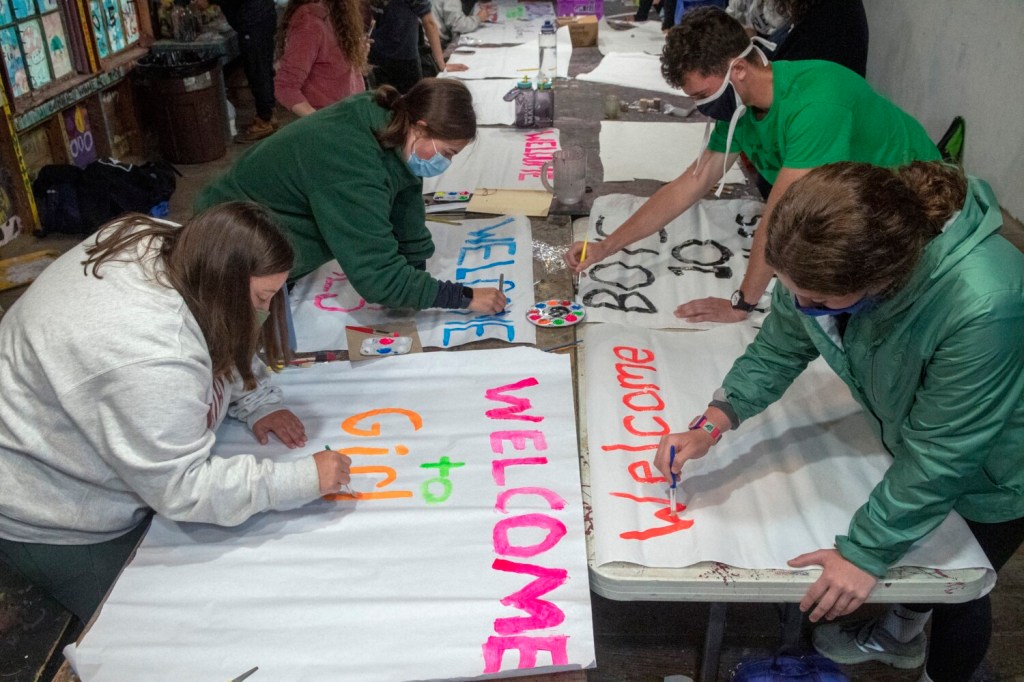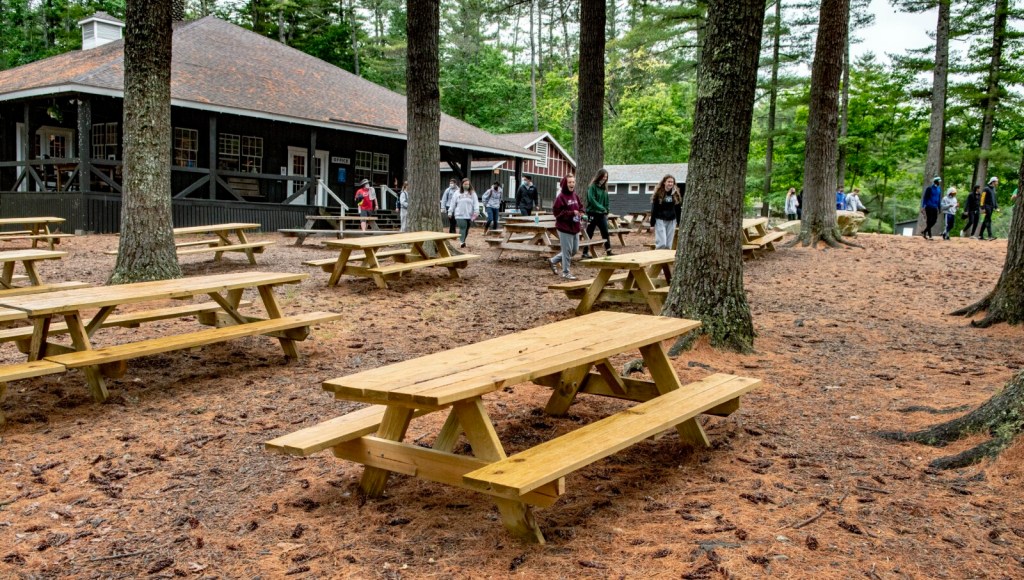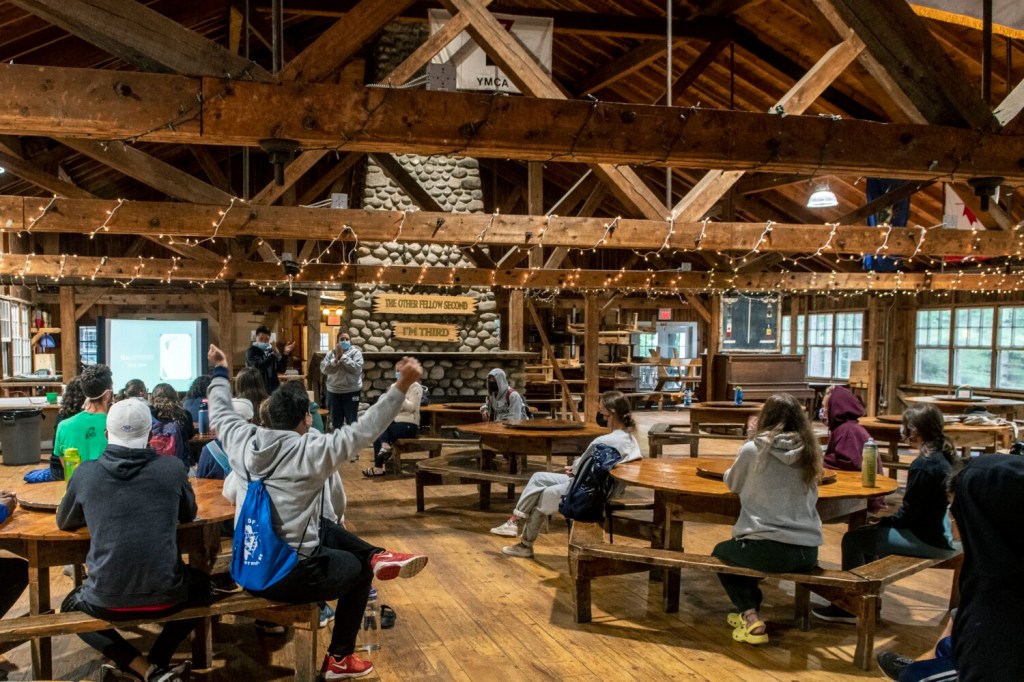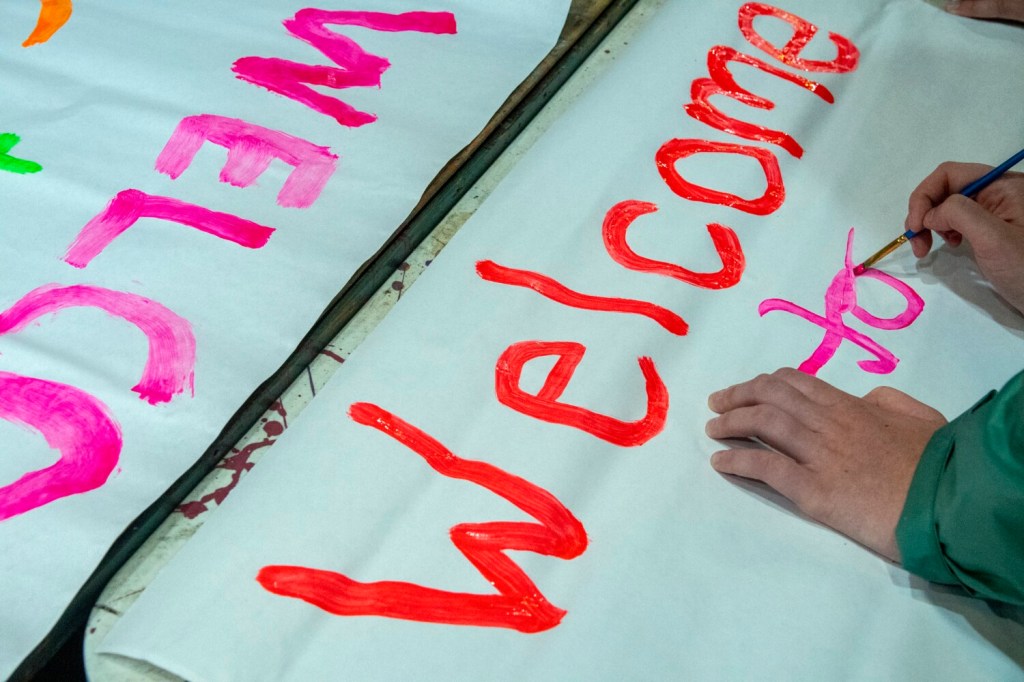Maine summer camps are having their “best year yet,” but are facing “unprecedented challenges” this season.
According to officials from most central Maine camps, they are filling up faster than they did before the coronavirus pandemic. But staffing shortages and food supply issues are proving challenging.
“Most camps were full, early on with a waiting list,” said Ron Hall, executive director of Maine Summer Camps, a nonprofit that represents 151 camps across the state. “It just shows how much families and kids want to get back to a normal life. Most of the camps I talked to said in March and April, they were having to put people on a waiting list.”
Maine summer camps contributed $495 million — directly and indirectly — to the state’s economy in 2019, Hall said. Even in 2020, he said, camps that chose to open with limited capacity contributed $190 million.
Abbie Charrier, director of camps and trips at Camp Tracy in Waterville, said the camp has been full since May.
“In a normal year, we can take campers up to the week before the week of day camp,” she said.
Maine camps attract campers and staffers nationally and globally. Hall said there is a even split among Mainers and out-of-state residents who attend summer camp, with 63,000 campers coming to the state each year.
The camps also produce increased activity at the Augusta State Airport. According to Bill Perry, president of Maine Instrument Flight, at least three dozen jets came in last weekend. In a normal year, he said, during parents’ weekend at the camps, the runway can see upwards of hundreds of private planes.
Hall said he can think of a couple of reasons why Maine summer camps are so popular.
“Maine has a huge number of camps over 100 years old,” he said. “Maine camps have a reputation for strong, traditional camp experiences. The second is, look at the geography of Maine, we have oceans, lakes, mountains — it’s just a beautiful place to come.”
This year most camps across the state will open with a capacity of least 85%, Hall said, with the smaller numbers needed due to the coronavirus guideline of people being spaced 6 feet apart while eating.
The coronavirus response from most camps across central Maine has been similar, with precautions still being advised. Most campers are unable to be vaccinated, since children currently have to be at least 12 years old to receive the COVID-19 vaccine.
Some camps — including Camp Runoia in Belgrade, Camp Winnebago in Fayette and the YMCA Camp of Maine in Winthrop — are requiring campers to be tested and are putting them in cohorts at the beginning of the week. Once campers test negative twice, the cohorts can be made larger.
The YMCA Camp also raised funds to purchase 30 picnic tables to increase outdoor eating capabilities and for larger monthly staff meetings.

Camp counselors pass rows of new picnic tables Friday as they walk toward arts and crafts building, to make signs to welcome the new campers arriving soon, at the YMCA Camp of Maine in Winthrop. Joe Phelan/Kennebec Journal
FOOD ISN’T ARRIVING
Howard Salzberg, director of Camp Modin, waited for his food delivery at 6 a.m. Thursday morning, but the truck never arrived.
“We had pizza bagels for breakfast because the vehicles never showed up,” he said.
Many camps across the state have had issues meeting their food supply needs due to a nationwide labor shortage. Not only have they had no food turn up without warning, camps have had to be creative or source meal supplies from elsewhere.
Salzberg said summer camps cannot “just run out” of food. To handle the issue, he has had to place a larger order or find other vendors.
“We can’t just run down to Hannaford or Shaw’s for groceries for thousands of meals,” Salzberg said. “We have rented refrigerator trailers, increased food capacity and taken more orders at once.”
He said if a normal order is around $3,000-$4,000 per week, Camp Modin has increased it to $12,000. That increases the company’s incentive to provide food to the camp, and allows Camp Modin to stock up on food when it does not know when it will be able to get its next supply.
Most Maine summer camps use Performance Foodservice, which has an Augusta location.
Performance Foodservice said the issue is related to the “nationwide supply chain and labor challenges across foodservice and other industries.”
“Performance Foodservice, like many distribution companies in foodservice and other industries, is managing supply chain and labor services,” the company said in a statement to the Kennebec Journal. “We are continuing to service camps, but unfortunately we can not service the needs of every camp and provided advanced notification to those affected. We remain focused on providing service and products to our customers — working with them when possible to make short-term adjustments.”
Salzberg reached out to Gov. Janet Mills, who he said responded in less than an hour. He said she connected him with Amanda Beal, commissioner of the Maine Department of Agriculture, Conservation and Forestry, as well as the state Department of Labor and Department of Economic and Community Development.
Beal said the departments have collaborated to create a list of resources for summer camps, and added that those are not the only organizations having a food supply issue.
“We compiled resources for additional product channels in the state, distributors, co-ops, direct food to consumer options, and provided resources through the ‘Real Maine’ program,” she said. Beal said they are adding a new page to their website with the resources.
Camp Runoia and Camp Modin have worked together on the issue, with the former eventually switching to Sysco for its food supply.
“We belong to a group of camps that help us out,” Pam Cobb, director of Camp Runoia, said.
The YMCA Camp of Maine in Winthrop has “struggled” with the problem as well, but have been able to rely on camp gardens, local growers and meat providers to fill the gaps. Camp Winnebago, an overnight camp in Fayette, has had to be “creative” in ordering food to get them through.
“We have been ordering extra food to stock up to make sure we have supplies,” Andy Lilienthal, owner/director of Camp Winnebago, said. “Luckily, we haven’t run out and we are still able to provide healthy, nutritious options.”

A camp counselor raises their arms after finding out to which cabin they’ve been assigned Friday at the YMCA Camp of Maine in Winthrop. Joe Phelan/Kennebec Journal
WORKER SHORTAGE, TOO
Since its start in 1915, the YMCA Camp has had strong roots with international workers and, in some cases, international campers. But this year, for one of the first times since its inception, it has had difficulty securing international workers due to the coronavirus pandemic.
“Jeff Smith, who started the camp in 1915, was a world traveler and started the camp for all-boys,” said Jeff Gleason, director of the YMCA Camp. “When he started traveling, he would find staff and recruit campers for all the reasons that campers would be able to live in a diverse community and learn about people from all over the world.
“It would be a pretty dynamic place in the summertime,” he added, “and we have tried to carry that tradition.”
Gleason said the YMCA Camp now hosts some three-generation international staff and campers. This year, however, only a select few were able to join the staff.
Hall said in a normal year, 13,000 individuals will make up staff at the state’s summer camps combined, with about 30% international staff.
The YMCA Camp, which is an overnight camp, did not open last year because of the coronavirus pandemic. This year it has had to adjust the number of campers it can accommodate because it has not be able to find enough staff. The camp would normally have about 180 campers, but this year they will have 115 for every two-week session.
Gleason said the main problem for the international worker shortage is travel restrictions, but also embassies are still closed in some countries. Workers have to go to the U.S. Embassy in their country to get an international work visa.
For those who were able to come work, the YMCA Camp helped workers get COVID-19 vaccines. The camp has workers from Canada, Colombia, Jamaica and New Zealand this summer.
“We still have half of our campers from Maine, we pride ourselves on that and making sure we are giving the Maine youth and Maine staff opportunities to have summer camp options,” Gleason said. “This year, we have a lot of new families and many returning families, and we have 60-70% staff from Maine.”
Camp Modin paid to quarantine and test its international workers, Salzberg said. To get some from the United Kingdom, he said, they routed them through Mexico and paid the extra airfare expense.
“There is an unpredicted labor shortage,” Salzberg said, “and we aren’t immune.”
To open like it would in a normal year, Pine Tree Camp in Rome, a camp for students who need special services, would have had a “really tough year,” according to Director Dawn Willard-Robinson. It did open last year, but with limited activities and an online option called Pine Tree Camp to You.
To adapt to the possibility of not having staff, the camp the created an online option, family day or weekend, said Willard-Robinson, and an Adventure Day Pass program, where campers can come with a parent, guardian, or caregiver to still participate in camp activities. The adjustments have minimized the need for staffers, in those cases.
“Staffing is challenging this year,” said Willard-Robinson. “It’s been challenging, and we have a really dedicated staff. We added the family weekend last year, then we decided to add a few more staff to provide what we need.”

After being told to which cabin they’ll be assigned, camp counselors create signs Friday to welcome their soon-to-arrive campers in the arts and crafts building at the YMCA Camp of Maine in Winthrop. Joe Phelan/Kennebec Journal
A SLOWER START, BUT HAPPY TO BE BACK
“You can tell something profound happened,” Lilienthal said of his campers return.
At Camp Winnebago, boys ages 8 to 12, just finished their first full week back.
Winnebago did open last summer, but only at around 60% to comply with coronavirus guidelines. Now, at 90% capacity, most campers have returned.
This year, Lilienthal said, campers needed the experience more than ever. He noticed an uptick in anxiety, fragility and even in their levels of activity.
“The balance of happy to be here, yet you can tell something profound has happened,” Lilienthal said. “They aren’t coming normal, like before COVID-19, but at the same time, they know they are at camp, and they are so happy to be here, and so happy to be connected and playing games and being active.”
At Winnebago, most boys stay for the whole summer, but some can choose to stay for half of it.
The camp consists of 90% out-of-state campers and around 10% of Mainers. Lilienthal said the campers come from the tri-state area of New York, New Jersey and Connecticut, but also as far as California and Hawaii. Overall, the 90% return rate among the out-of-staters is comparable to normal years.
Welcoming the campers back has been a “slow immersion process,” Lilienthal said.
“We have been mindful,” he said. “We have tried to talk about what their experiences have bene and how they feel about being here.”
Camp Runoia, an all-girls overnight camp, has had a similar experience in its first few weeks.
It opened at around 60% capacity last summer and is at 90% this year with about 135 campers expected, Cobb said. There are 90% out-of-state residents attending, and around 10% Mainers, she said, adding that there is “so much joy” this summer.
“They’re ecstatic, especially girls who didn’t come last year,” Cobb said. “Some haven’t been since 2019. Two years in their short lives is a long time and a lot has changed. It’s a great feeling, they are coming out of something difficult.”
She said there have been a few campers with separation anxiety, and noted it is the first time many have been in a group other than family or bigger than about 10 peers.
“They have been with their families for 16 months, now, suddenly they’re sharing a space with 14 others,” she said.
Lilienthal said he believes the camp experience is needed for the kids this year, more than ever.
“I’ve always felt strongly that a camp experience is good for kids and can be profoundly positive for kids,” he said. “The last two years convinced me of it.”
For a two-week session at the YMCA Camp, the maximum cost is $1,697. A few weeks at Camp Runoia, the cost ranges from $7,000-$11,000. A summer at Camp Modin costs $14,300 and it is $14,500 to attend Camp Winnebago for the summer.
Send questions/comments to the editors.







Success. Please wait for the page to reload. If the page does not reload within 5 seconds, please refresh the page.
Enter your email and password to access comments.
Hi, to comment on stories you must . This profile is in addition to your subscription and website login.
Already have a commenting profile? .
Invalid username/password.
Please check your email to confirm and complete your registration.
Only subscribers are eligible to post comments. Please subscribe or login first for digital access. Here’s why.
Use the form below to reset your password. When you've submitted your account email, we will send an email with a reset code.